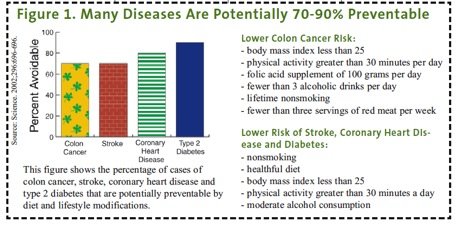An Ounce of Prevention
 A fairly recent book, The Last Well Person, by Nortin M. Hadler, MD, seeks to help individuals understand the perils of the Western medical system – with its heavy emphasis on drugs and surgery.
A fairly recent book, The Last Well Person, by Nortin M. Hadler, MD, seeks to help individuals understand the perils of the Western medical system – with its heavy emphasis on drugs and surgery.
Diet and lifestyle intervention can prove to be far superior to drugs and surgery in terms of longevity and quality of life. Why? Logically, the first step in preventing and usually treating a disease is to identify the cause of the disease, and eliminate the causal agents whenever possible. The causes of hypertension, atherosclerosis, obesity, type 2 diabetes and most common cancers have been largely identified. Poor diet, inactivity, smoking and heavy drinking are largely responsible for causing the diseases that kill most Americans.Throughout the book, Hadler, who is a professor of medicine and microbiology/immunology at the University of North Carolina at Chapel Hill, builds the case that physicians today fail to meet the expectations and needs of their patients by relying on too many tests, procedures and drugs that drive up costs, but provide little health benefit.
Lower Cholesterol Increases Life ExpectancyData from the Framingham Heart Study followed men in their 30s for 30 years. They found that those in the highest quartile of serum cholesterol levels in their 30s were more than twice as likely to be dead in their 60s compared to those with the lowest cholesterol!• Treatment of high cholesterol levels with statin drugs only reduces cardiovascular disease (CVD) mortality by 20-30%. The drugs have only a negligible impact on total mortality, increasing life expectancy by just a few months after years of treatment.• Atherosclerosis is not reversed by drugs in most people; whereas a very-low-fat, near-vegetarian diet has been shown to reverse atherosclerosis and dramatically cut the risk of dying. • The treatment of coronary artery disease with angioplasty and bypass surgery does little or nothing to reduce one’s risk of dying from CVD and has no impact on longevity.
Diabetes Doubles Risk of DyingPeople with type 2 diabetes are about twice as likely to die in any given year as those the same age with normal glucose tolerance. The figure below summarizes the best epidemiological data and indicates that at least 90% of all type 2 diabetes cases could probably be prevented with a healthier diet and lifestyle.
Cancers Can Be PreventedMost of the common cancers (lung, breast, colon, ovarian, pancreatic, and prostate) are largely the result of smoking, inactivity, poor diet, weight gain, and/or heavy drinking. In a recent commentary in the Journal of the American Dietetic Association, Dr. Frank Hu states: “…the current overemphasis on pharmacologic treatment could lead to exaggeration of benefits of drug treatment in primary prevention and deflect attention from diet and lifestyle modifications.” Dr. Hu argues epidemiological and clinical trials strongly suggest that a healthy diet and lifestyle could cut the risk of developing many common cancers by about 70% or more. Dr. Hu also maintains a healthy diet and lifestyle could cut the risk having a heart attack or stroke by at least 70% and probably more.1
Death from Old AgeThere is good data showing that the total mortality doubles in humans every 8 years and a large proportion of this increased risk of dying is a result of the aging process itself, something no drug or other medical intervention can impact.However, a recent study that showed obese women appeared 9 years older biologically than those who were normal weight. This same study showed that women who smoked until they were 60 years old were also about 9 years “older” on average.
Bottom Line: The benefits of a much healthier diet and lifestyle for reducing type 2 diabetes, cardiovascular diseases, many common cancers and many other ills are potentially far greater than drugs and surgeries. By James J. Kenney, PhD, RD, FACN. Reference:1. JADA, November 2005, page 1718.